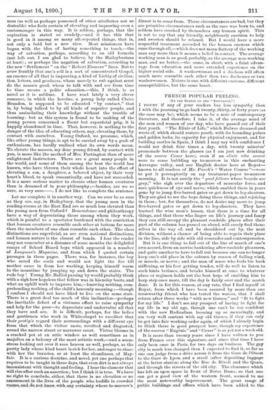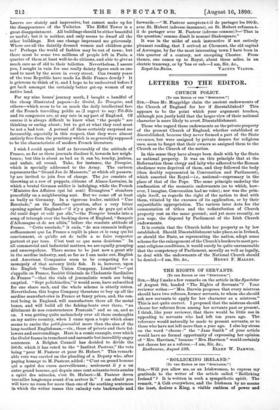FRENCH POPULAR FEELING.
[To THE EDITOR OF THE "SPECTATOR."] I DOUBT if any of your readers has less sympathy than I with the yearning to go back twenty, thirty, or forty years (as the case may be), which seems to be a note of contemporary literature, and therefore, I take it, of the average mind of the men and women of our day, who have passed out of their first youth. " The Elixir of Life," which Bulwer dreamed and wrote of, which should restore youth, with its bounding pulses and golden locks, its capacity for physical enjoyment, and for building castles in Spain, I think I may say with confidence I would not drink four times a day, with twenty minutes' promenade between the glasses (as I am just now drinking of the source Casar here), even if an elixir vita source were to come bubbling up to-morrow in this enchanting Auvergne valley, and our English doctor here at Royat- known to all readers of Mr. Punch's " Water Course "—were to put it peremptorily on my treatment-paper to-morrow morning. It is not surely the " good fellows whose beards are grey," who sigh over the departure of muscular force, and sure quickness of eye and nerve, which enabled them in years gone by to jump five-barred gates or get down to leg-shooters. They are glad to see the boys doing these things, and rejoicing in them ; but, for themselves, do not desire any more to jump five-barred gates or get down to leg-shooters. They have learned the wise man's lesson, that there is a time for all things, and that those who linger on life's journey and fancy they can still occupy the pleasant roadside places after their part of the column has passed on ahead, will surely find them- selves in the way of, and be shouldered out by, the next division, without a chance of being able to regain their place in the line, side by side with old comrades and contemporaries.
But it is one thing to fall out of the line of march of one's own accord, from an unwise hankering after roadside pleasures, and quite another to have to fall out because one can no longer keep one's old place in the column by reason of failing wind, or muscle, or nerve; and the man of sense who feels his back stiffening, or his feet getting tender, will do well to listen to such hints betimes, and betake himself at once to whatever place or regimen holds out the best hope of enabling him to keep step once more, till the day is fairly over and the march done. It is for this reason, at any rate, that I find myself at Royat, from which I have been assured by more than one trustworthy friend who has tested the waters, that I shall return after three weeks " with new tissues," and " fit to fight for my life." I don't see any prospect of having to fight for my life in my old age, though one can't be too confident with the new Radicalism looming up so menacingly, and am very well content with my old tissues, if they can only be got into fair working order again, of which I already begin to think there is good prospect here, though my experience of the sources "Eugenie" and " Cnsar" is as yet not a week old.
It is more than twenty years since I have written to you from France over this signature, and since that time I have
only been once in Paris, for two days on business. The gay
city is much less changed than I expected to find it, so far as one can judge from a drive across it from the Gare de l'Ouest
to the Gare de Lyon, and a stroll (after depositing luggage
at the latter station) along the Rue de Rivoli and the Qnais, and through the streets of the old city. The clearance which
has left an open space in front of Notre Dame, so that one can get a good view of the western front, seemed to me the most noteworthy improvement. The great range of pnbiic buildings and offices which have. been added to. the
Louvre are stately and impressive, but cannot make up for the disappearance of the Tuileries. The Eiffel Tower is a great disappointment. All buildings should be either beautiful or useful ; but it is neither, and only seems to dwarf all the other buildings. But one change impressed me grievously. Where are all the daintily dressed women and children gone to P Perhaps the world of fashion may be out of town ; but there must be some two millions of people left in Paris, a quarter of them at least well-to-do citizens, and able to give as much care as of old to their toilettes. Nevertheless, I assure you, I sought in vain for one really dainty figure such as one used to meet by the score in every street. Can twenty years of the true Republic have made La Belle France dowdy ? It is grievous to think of it, and I hope to be undeceived before I get back amongst the certainly better got-up women of my native land.
For my nine hours' journey south, I bought a handful of the cheap illustrated papers—Le Grelot, Le Troupier, and others—which seem to be as much the daily intellectual fare of the French travelling public as (I regret to say) Tit-Bits and its congeners are, at any rate in my part of England. Of course it is always difficult to know what "the people" are thinking or caring about ; but to get at what they read must be not a bad test. A perusal of these certainly surprised me favourably, especially in this respect, that they were almost entirely free from the pruriency which is so generally supposed to be the characteristic of modern French literature.
I wish I could speak half as favourably of the attitude of France, so far as these journals disclose it, towards her neigh- bours; but this is about as bad as it can be, touchy, jealous, and unfair, all round. Take, for instance, the Troupier, which is specially addressed to the Army. The cartoon represents the " Grand Jen de Massacre," at which all passers- by are invited to join free of charge. The jeu consists of throwing at a row of puppets, citizens of Aimee-Lorraine, in which a brutal German soldier is indulging, while the French "Ministre des Affaires (qui lui sont) Etrangeres " slumbers peacefully on a. neighbouring seat. But we come off at least as badly as Germany. In a vigorous leader, entitled " IIne Reculade," on the Zanzibar question, after a very bitter opening against England—" it n'y a guere de pays qui n'ait etc mule dupe et vole par elle,"—the Troupier breaks into a song of triumph over the backing-down of England, " flanquee d'Allemagne et de sea allies," before the resolute attitude of France. " Cette reculade," it ends, " de nos ennemis indique suffisamment que La France a replit la place et le rang qui lui conviennent, et qu'elle eat de taille a se faire respecter partont et par tons. C'est tout ce que nous desirions." In all commercial and industrial matters, we are equally grasping and unscrupulous. There seems to be just now a great stir in the sardine industry, and, so far as I can make out, English and American Companies seem to be competing for a monopoly of that savoury little fish. It is, however, upon the English " Sardine Union Company, Limited "—" qui s'appelle en France, Societe Generale de l'Industrie Sardiniere de France "—that the vials of journalistic wrath are being emptied. " Sept polichinelles," it would seem, have subscribed for one share each, and the whole scheme is utterly rotten. Nevertheless, this bogus Company threatens to buy up all the sardine manufactories in France at fancy prices, and, the con- trol being in England, will manufacture there all the metal boxes, and will build all the fishing-boats over there, " an detriment de nos constructeurs Francais," and so on, and so on. I was getting quite melancholy over all these onslaughts on my native country, when I came upon a topic which alone seems to excite the petit-journalist more than the sins of the long-toothed Englishman,—viz., those of priests and their fol- lowers and surroundings. Here is a comic example, over which the Grelot foams in trenchant and sarcastic but incredibly angry sentences. A Belgian Council has decided to divide the 500 fr. which it has voted to the " Institut Pasteur," the vote being "pour M. Pasteur et pour St. Hubert." This remark- able vote was carried on the pleading of a Deputy who, after paying homage to M. Pasteur, added : " C'est un grand homme qui a ope're des cures merveilleuses ; seulement it y a un entre grand homme, qui depuis onze cent soixante-trois annees a opere des miracles, c'est St. Hubert—M. Pasteur devra travailler longtemps avant d'en arriver Th.." I am afraid you will have no room for more than one of the scathing sentences in which the writer tosses this unlucky vote backwards and forwards :—" M. Pasteur acceptera-t-il de partager lea 500 fr. avec St. Hubert (adresse inconnue), on St. Hubert ref usera-t- il de partager avec M. Pasteur (adresse connue) P—' That is the question,' comme disait le nomme Shakespeare."
It was in the midst of such instructive if not entirely pleasant reading, that I arrived at Clermont, the old capital of Auvergne, by far the most interesting town I have been in this quarter of a century, not excepting Chester. From thence, one comes up to Royat, about three miles, in an electric tramway, or by 'bus or cab.—I am, Sir, &c.,



































 Previous page
Previous page